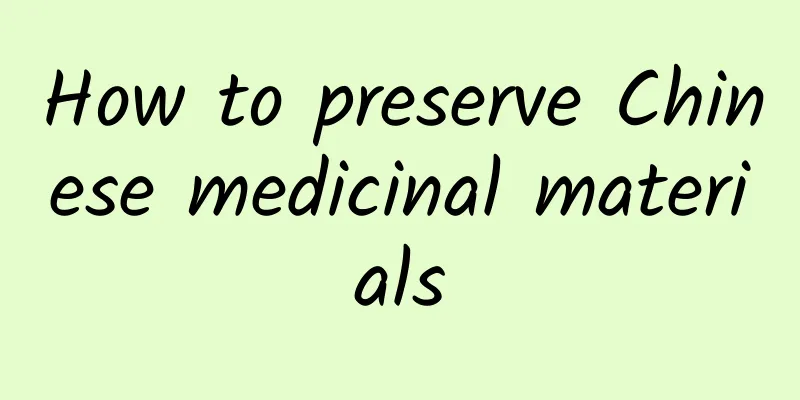How to preserve Chinese medicinal materials

|
Each kind of herbal medicine is produced in different places and has its own characteristics, so it must be classified when stored. Some Chinese medicinal materials are afraid of moisture and must be placed in a cool and dry place, otherwise they will mold, which will not only fail to treat diseases but also bring certain harm to the body. Some Chinese medicinal materials need to be soaked in water, so that the efficacy can be maintained for a long time. Here is an introduction to how to store Chinese medicinal materials? Chinese angelica and other medicinal herbs that easily lose oil are afraid of moisture. During storage, due to factors such as moisture, the oil and other substances contained in the medicinal materials are likely to precipitate out of the surface of the medicinal materials, like a layer of oil, also known as "oil loss". Fruits and species of medicinal materials are prone to oil loss, such as almonds, ophiopogon, angelica, codonopsis, longan, and jujube. These medicinal materials should be kept as dry as possible. Medicinal herbs that are easily damaged by insects, such as ginseng, are afraid of insects. When Chinese medicinal materials are collected and stored, they may be infested with insects or carry insect eggs, causing them to be infested. When medicinal materials are infested with insects, holes and powder will appear. Some pests reproduce rapidly and may make the medicinal materials "scrapped". Sweaty herbs, scutellaria, rhubarb, ginseng, and angelica dahurica are more susceptible to insect infestation. Medicinal materials that are slightly infested with insects can be processed and reused, while those that are severely infested with insects should be discarded in a timely manner. Medicinal materials that are easy to change color, such as peony bark, are afraid of the sun. Medicinal materials all have their own colors. Peony bark and other herbs can reduce their efficacy while changing color. Some medicinal materials contain compounds that are prone to degradation and discoloration; exposure to sunlight or baking at excessively high temperatures can also cause discoloration of medicinal materials. This type of medicinal material should be stored away from sunlight. Such as Xuxiang Zhengqi Pills (water), Baojijiu, Berberine Tablets, Montmorillonite Powder, etc., can treat abdominal pain, diarrhea, abdominal distension, vomiting and water indigestion. Mami Love, Tribabacterium, and Bifidobacterium are mainly used to treat diarrhea, constipation, abdominal distension, enteritis, etc. caused by intestinal flora disorders in children and need to be refrigerated at 2℃-8℃. Vitamin C Yinqiao Tablets are prone to mechanical failure when exposed to high temperature or sunlight, and should be avoided from direct sunlight: Antiviral oral liquid, Keganliming oral liquid, Qingkailing oral liquid and other liquid preparations should be kept away from light, sealed and cool: Xiao Chaihu Granules should be kept away from moisture and high temperature: Motrin should be stored in a dark place, placed in the refrigerator after opening and finished as soon as possible within a month within a short period of time. Wu Ji Bai Feng Wan should be taken to prevent moisture and soil changes. Donkey-hide gelatin should be stored in the refrigerator to avoid melting at high temperatures. Angelica cannot be exposed to the sun and is best kept in the refrigerator. Angelica heads become hard like stone when stored at low temperatures and are difficult to handle when used. Therefore, it is recommended to buy pre-cut angelica slices. Red dates are also prone to infestation and weight gain. After buying it home, it is best to dry it in the sun first, and then store it in the refrigerator or other sealed containers. Ginseng and American ginseng are prone to infestation by insects, so it is best to store them in the refrigerator. The seeds of the genus Mume tend to turn black when exposed to air and should be stored in a sealed container. Huaishan (Chinese yam) cannot be exposed to the sun directly, otherwise its color will turn red. Codonopsis pilosula contains the highest amount of parasites and is effective in preventing insects and moisture. Lotus seeds should be protected from insects and stored in the refrigerator. Snow clam is rich in protein and will generally go bad if refrigerated for a long time, so it should be frozen for emergency storage. |
<<: Chinese medicinal herbs for stewing meat
>>: The role of Chinese medicinal material Dendrobium
Recommend
Can acupuncture cure varicose veins?
Varicose veins are a relatively common disease, e...
Monk Fruit Cough Syrup
Medicine is very common in our life. There are ma...
What are the benefits of sweating after confinement?
We all know that it is necessary for women to sta...
Six vital points of life must be protected
Human life is tenacious, yet fragile. In the face...
Is lower abdominal cramping a sign of pregnancy?
In fact, women's bodies generally show some s...
What are the effects of bamboo snake soaking in wine?
The effects of bamboo green snake. Bamboo green s...
What to do if you are nervous and can't relax when sleeping
If you are nervous and unable to relax when you g...
Symptoms of Cardiac Inflammation
What are the symptoms of cardia inflammation? Thi...
What causes swollen eyes and feet?
People need to understand that swollen eyes are a...
Sigmoidoscopy method
There are many types of colonoscopy at present. D...
What are the Chinese medicines that can be used to make wine?
Medicine is the most important substance in life,...
There is such a huge difference between men sleeping naked and women sleeping naked! Did you know?
Some people like to sleep naked, especially in su...
Will drinking soy milk during breastfeeding cause milk to dry up?
During breastfeeding, you are always afraid to ea...
What are the effects and functions of plant dragon bones?
The Chinese nation believes in real dragons, but ...
Can overbite be corrected by oneself?
Overbite is a type of face shape, but more import...









